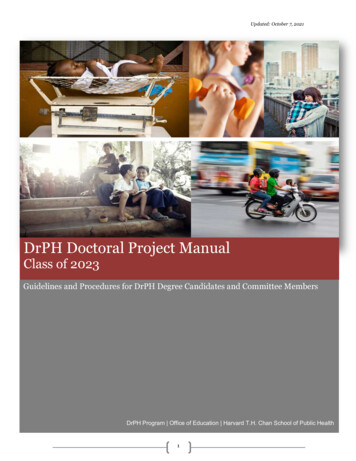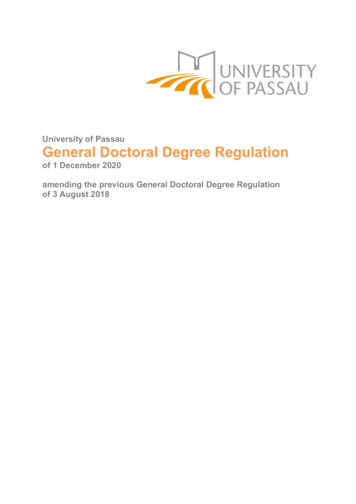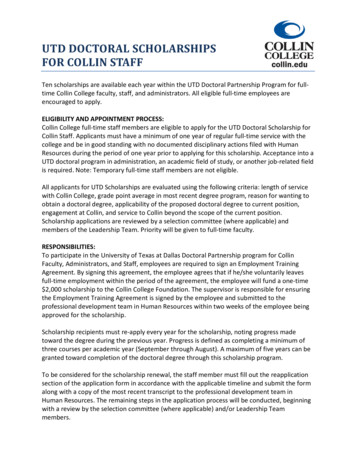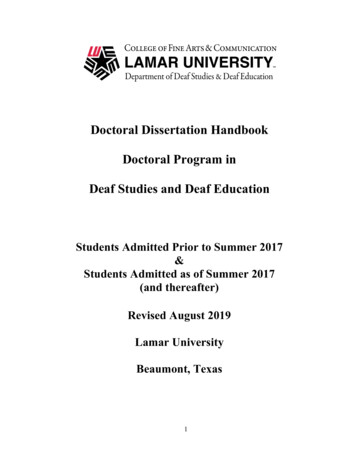
Transcription
Updated: October 7, 2021DrPH Doctoral Project ManualClass of 2023Guidelines and Procedures for DrPH Degree Candidates and Committee MembersDrPH Program Office of Education Harvard T.H. Chan School of Public Health1
Updated: October 7, 2021TABLE OF CONTENTSPart I: An OverviewThe Doctoral ProjectThe Doctoral Project DeliverablesThe Doctoral Project CommitteeMilestones and Timetable AcknowledgementPart II: The Doctoral ProjectPart III: Deliverables from the Doctoral Project: the Doctoral Thesis,Reflection Report on Leadership and Enabling Change, and OtherDeliverablesThe Doctoral ThesisMain Components of the ThesisStyle and Formatting of the Doctoral ThesisSubmission of Doctoral ThesisThe Reflection Report on Leadership and Enabling ChangeOther DeliverablesPart IV: Doctoral Project CommitteeMembers: Roles and ResponsibilitiesDeclaration of the Doctoral Project CommitteeChanging Doctoral Project Committee MembersIn Case of ConflictPart V: Doctoral Project Milestones, Timetable and DescriptionsDoctoral Project Milestones & Deliverables TimetableMilestones, Submissions and Required FormsPart VI: The Oral Examinations (OQE & OFE)Oral Qualifying Examination PreparationOral Final Examination PreparationCriteria for Evaluation of the Doctoral ProjectScheduling the Oral Final ExaminationOral Examinations GradingPart VII: Registration, Visa, Health Insurance and Travel WaiversResident v. Non-Resident StatusVisaHealth InsuranceTravel WaiverPart VIII: Ethical ConsiderationsOverviewExpectations of Degree Candidate in a Professional ContextUse of Human SubjectsConsentDocumenting the Contribution of Others and PlagiarismGuidelines on Public Availability and ConfidentialityAppendicesAppendix A: Examples of Doctoral ProjectsAppendix B: Doctoral Proposal Outline and Guiding QuestionsAppendix C: Doctoral Thesis Title Page2
Updated: October 7, 2021Appendix D: Doctoral Thesis Signature PageAppendix E: Travel GuidelinesAppendix F: Considerations for a Host Organization AgreementAppendix G: Where to Find a Form or DocumentThe DrPH Program has tailored this handbook with specific guidelines for the DrPH graduating class of 2023. It is subject to change.3
Updated: October 7, 2021Part I: An OverviewThe Harvard DrPH degree program integrates foundational knowledge of public healththeories and methods with the competencies of leadership, management,communication, and innovation necessary for bringing about significant change. As apractice-oriented degree, the program's goal is to prepare future public health leaders forhigh-level roles in the fields of public health and healthcare, enabling them to translateknowledge into action as they address complex problems.The Doctoral ProjectThe DrPH Doctoral Project is the culminating experience of the Harvard DrPH degreeprogram, and the primary locus of the knowledge translation elements of the degree. TheDoctoral Project provides an opportunity for the DrPH degree candidate to practice anddevelop leadership skills while engaging in a project that contributes substantively topublic health or healthcare.A typical project is built around a student and host organization relationship, althoughmore independent work may be appropriate in some cases. Through an 8- to 10-monthfield-based experience,1 DrPH degree candidates engage in a partnership with anorganization on a public health or healthcare-related project or work on an independentproject of their own design to apply their advanced training from the first two years ofthe program.The Doctoral Project DeliverablesThe final products of the Doctoral Project include a Doctoral Thesis, a Reflection Reporton Leadership and Enabling Change, and other deliverables. The Doctoral Thesis is asubstantive piece of written work that documents the background, justification, andresults of the project work. The Reflection Report is an opportunity for doctoralcandidates to reflect on their personal leadership growth and development during theprogram. The other deliverables category includes additional written work resultingfrom the project that may not be in the usual academic format, including, for example,reports or presentations for the host organization.The Doctoral Project CommitteeThe candidate's Doctoral Project Committee guides the Doctoral Project. The committeeassists the student in preparing the project proposal, supports the candidate during theproject, and examines the candidate on the project deliverables. Students will follow aspecific series of steps and milestones beginning in the second year of the program,culminating in the completion of the DrPH Program. Each milestone plays an integralpart in ensuring that a degree candidate is making satisfactory progress toward theirdeliverables and graduation and is getting adequate support.Milestones and Timetable AcknowledgmentThe Doctoral Project timetable and milestones enable a student to complete all degreerequirements for a May Commencement in the program’s third year. Key milestonesinclude nominating a committee, submitting a final program of coursework, developing aproject proposal, passing an oral qualifying examination, submitting progress reports,completing the Doctoral Thesis, the Reflection Report, and the DrPH Oral FinalExamination.1The project may extend beyond this time by mutual agreement between the student, the hostorganization, and the program.4
Updated: October 7, 2021Part II: The Doctoral ProjectThroughout the Doctoral Project, students will develop, apply, and integratecompetencies in foundational academics, enabling change, personal leadership, andknowledge translation. The project should make a significant contribution to the field ofpublic health or healthcare. The project's impact may be achieved by directly improvingoutcomes in population health or in organizations, or through the creation of significantinnovations that can effect such change. Examples include the establishment,implementation, or evaluation of a public health initiative; managing and enhancingexisting efforts; engagement in developing the strategy of an organization or policyinitiative; or development of an innovative product or service. The project will also helpdevelop the degree candidate's leadership capabilities and their ability to facilitatechange.The Doctoral Project Committee plays a crucial role in the development of the project,supervision of the student's progress, and final assessment of the project’s sufficiency forawarding of the degree. This manual broadly defines the scope and criteria for theDoctoral Project. But the evaluation of the project work will ultimately rest with thecommittee through a process of committee review and assessment, and an oral finalexamination.Throughout the Doctoral Project, the student will be in close contact with his/her/theirDoctoral Project Committee for feedback, discussion, and evaluation. The student willalso provide all deliverables to the committee. Students may consult with the DrPHFaculty Director in coordination with the Doctoral Project Committee chair.To develop a successful Doctoral Project, students should follow a set of linked stepsaligned with the administrative timetable outlined later in this Manual The order ofthese steps is not fixed and may differ for different students and projects as students andcommittee members iterate toward a final project. For example, students need to:Table 1: Recommended steps to develop a successful Doctoral ProjectAIdentify a public health issue, problem, or concern as well as personalleadership goals on which to focus. The specific focus of the project should fitwithin a larger complex public health issue.B Engage with a Harvard Chan faculty member who agrees to chair the ProjectCommittee and other potential committee members according to the programguidelines.C Seek out and engage with a host organization with which the student will work,except in conditions where the Project Committee may approve independentwork.D Identify means for funding the third-year project experience, including travel,housing, and living stipend (if applicable).E Develop deliverables, role, and scope of work with the host organization orstakeholders.F Develop an entry plan with the host organization supervisor and doctoralcommittee members.5
Updated: October 7, 2021Part III: Deliverables from the Doctoral Project: the DoctoralThesis, Reflection Report on Leadership and Enabling Change,and Other DeliverablesThe Doctoral ThesisThe Doctoral Thesis is the primary academic product of the project. It reflects thecompetencies that the student has developed through doctoral coursework, fieldimmersions, and the enabling change curriculum that is a core piece of the degreeprogram.The thesis itself is a descriptive, analytic, and reflective account of the student’sleadership contributions to a strategic project within a host organization, or in anindependent project. It is a demonstration of the student’s ability to engage others,develop a strategy to successfully address and diagnose challenges, work toward a visionand goals, and learn from the results. The thesis should position the student’s specificproject within a broader complex public health context and include a review of relevantpublic health and related literature.The DrPH Program's pedagogical origins and goals differ from those of a traditionalPhD, SD, or DPH program. Traditional doctoral programs prepare students for a careerin original research and academics, and the final written products of the degree aretypically three articles prepared for peer-reviewed journals. Because the DrPH Programis practice-oriented, the final thesis presents the results of the student’s final project inwhich they tackled a complex public health issue and focused on translating knowledgeinto action and enabling and facilitating change.The Doctoral Thesis should be a 60- to 90-page double-spaced document preparedusing standard doctoral thesis formatting. The Doctoral Thesis will be submitted to andretained in the Harvard University Archives.The Main Components of the ThesisThe main components of the Doctoral Thesis are described below with suggested pagelengths. Every project and thesis are unique, so the structure and content of the thesishave some flexibility; the degree candidate should discuss the specific details of theirthesis with their committee. Also, the page length guidelines are recommendations only.The actual length of written deliverables for the Doctoral Project should be appropriateto the content.I.Thesis Title PageSee Appendix C for formatting guidelines.II.Abstract (suggested page range: 1 – 2 pages)The abstract provides a summary of the public health issue and the specificproject undertaken by the student and why it is important, the results/findings,and critical lessons learned.III.Table of ContentsIV.List of Figures or TablesV.Acknowledgments (optional)A section where the student acknowledges and thanks those who have helpedsupport them in their project and degree program.6
Updated: October 7, 2021VI.Introduction (suggested page range: 4 - 5 pages)The introduction provides an overview of the broad public health issue that willbe the focus of the project and describes the specific project and its goals. It alsogives a brief overview of the thesis contents.VII.Background, Literature Review and Framework for Change (suggestedpage range: 15 - 25 pages)This section provides a more in-depth discussion of the broad public healthproblem that motivated the project work, a review of relevant literature, adescription of a framework for change that the student utilized during theproject, and a detailed description of the project itself.The purpose of the literature review – which should include public health andrelated literature – is to explore and substantiate existing knowledge of theproblem, and to provide a context for the project. The framework for changeprovides a theory or approach that the student uses to help analyze, understand,and address the problem, and to design an approach to improvement and change.The literature review and framework for change should provide the underpinningfor a discussion of the project in explicit detail, including a description of thedesign, project goals, and expected strategy.VIII.Methods and Analyses (suggested page range: 15 – 20 pages)This section should present a description of the qualitative and/or quantitativemethods and approach used to explore the problem, generate data and insights,and identify options for intervention. This section should also present significantfindings from these analyses.IX.Results (suggested page range: 20 - 30 pages)The results section focuses on the outcomes of the project. It presents a narrativediscussion of what transpired during the project, including the degree to whichthe student achieved the stated goals and objectives. Not every project must besuccessful or achieve its goals; a project that did not meet its goals might yieldimportant results for both the degree candidate and host organization. Forexample, in a situation where a student does have sufficient time to fully achievethe project goals, the results section will focus more on the process and relatedlearnings than on outcomes.In presenting results, students should reconsider the framework for change theyselected for use in the project, and how useful – or not useful – it was in helpingto structure an approach and enable change. The results statement may include adiscussion of issues in leadership, management, and organizational behavior thatwere relevant to the project's outcome, including a description of theorganizational context of the project, barriers encountered, and how the barrierswere or could be overcome.The results statement may also discuss what the host organization has learneddue to the project, and its implications for the organization's future work. It isimportant to note, however, that the thesis will be a public document. Otherdeliverables could also be a vehicle for recommendations to the organization thatshould not be made formally public.7
Updated: October 7, 2021The Doctoral Project Committee will assist DrPH students in crafting an effectiveresults statement in the thesis. The student should review drafts with thecommittee before the final oral examination.X.Conclusion (suggested page range: 5 – 7 pages)The concluding section broadly reviews the project, key findings, and mainanalytical takeaways. Rather than repeating previously discussed findings, thestudent can use the Conclusion to reflect on how the project can contribute tobroader learning in public health, and to propose questions and topics for futureinvestigation.XI.BibliographyA complete list of formatted, cited material and sources using the citation andstyles guide.XII.AppendicesThe student can include additional relevant material for the thesis as appendices.When compiling these documents, the student should consult with the DoctoralProject Committee and cite them in the thesis with appropriate references.Style and Formatting of Doctoral ThesisIt is the degree candidate's responsibility to ensure the Doctoral Thesis meets theHarvard Chan School's doctoral thesis formatting criteria and uses proper citation style.To ensure appropriate style and formatting, please visit the Registrar’s Website fordetails and follow the directions carefully.The DrPH Program follows the dissertation/thesis formatting and style listed on theRegistrar's Website, except for the title and signature page. Please see Appendices C& D for the Thesis Title and Signature Page templates. The student should complete allformatting and style work before submitting the Doctoral Thesis for the Oral FinalExamination and to Harvard’s Electronic Thesis and Dissertation System(ETDs@Harvard).Submission of the Doctoral ThesisFor a May 2022 commencement, Harvard requires degree candidates to upload the finalapproved electronic version of their Doctoral Thesis via Harvard’s Electronic Thesis andDissertation system (ETDs @ ProQuest) no later than April 15, 2022, at 5:00 PMEDT (TBD). Once each member of a degree candidate’s Doctoral Project Committeesigns the Signature Page for the final approved version of the thesis, the student shouldupload this page along with the thesis to ETDs @ ProQuest (further details will beprovided by the Registrar's Office closer to time of submission). The Signature Pageshould be signed once each committee member approves the final version of the doctoralthesis. This signing may be at the Oral Final Examination or a later date after the studenthas completed revisions.Please remember, there are no exceptions to the submission date and time.If missed, the candidate will not be able to graduate in May 2023.As of 2015, the Harvard T.H. Chan School of Public Health does not require students tosubmit hard copies of their thesis or dissertation. For more information on ordering abound dissertation/thesis, please visit the Registrar’s Office webpage.8
Updated: October 7, 2021The Reflection Report on Leadership and Enabling ChangeThe second written deliverable of the Doctoral Project is the Reflection Report onLeadership and Enabling Change, a 15- to 20-page double-spaced statement about thedegree candidate's leadership development journey, insights into effectively enablingchange, and cumulative experiences in the DrPH Program. Students are encouraged tokeep a journal throughout their project to help recall progress and challenges and toextract valuable insights on these topics at the conclusion of the project.The Reflection Report is not required to be retained as part of your thesis submission tothe Harvard University Archive. It could be submitted as an Appendix if the studentdesires, and the committee agrees. However, it must be submitted to your DoctoralCommittee for discussion during your Oral Final Examination, and a copy also mustbe provided to the DrPH Program for our records. The DrPH Program will notshare your Reflection Paper with anyone outside of the DrPH Program.The Reflection Report offers the student an opportunity to focus on the personal goalsthey set for themselves during the program and final project, what they have learned,and how they envision applying their academic work and applied experiences in theirfuture careers as public health leaders. Some questions to consider could be:1. Review your leadership development goals from the beginning of the program. Wereyou able to accomplish these? Why or why not? Have you revised your goals for thenext phase of your career, and if so, how are these revised goals informed by yourdoctoral project experience?2. What challenges did you face during your doctoral project, both at the “balcony” and“dance floor” levels? What did you try that helped you address these challenges?Were there things you tried that were not helpful? How might these experiencesshape your leadership practice in the future?3. What value did the project provide to your understanding of your future roles andgrowth as a public health leader? Were there things that surprised you about yourleadership development growth during the doctoral project?4. How did the DrPH experience contribute to your understanding and ability to enablechange in an organization of your choosing and the broader public health field?Think about your personal qualities as well as aspects of an organization that mayimpact your ability to be an effective leader.Other DeliverablesIn addition to the Doctoral Thesis and Reflection Report on Leadership and EnablingChange, the degree candidate may be required to produce other deliverables of publichealth interest. These deliverables will vary by student and can take a variety of formsand media. Before starting the Doctoral Project, these deliverables will not need to bedefined as they will be developed during the project with a host organization and inconsultation with the committee. Other deliverables may include a program or projectevaluation, a results report, or an evaluation plan or policy statement for the hostorganization. It may also include products in other media such as a blog, new mediareport, movie, webinar, or website. Other possibilities may include resources fordissemination (toolkit, educational/communication materials, or presentation to acommunity group) or advocacy products, policy briefs, or presentations to legislativerepresentatives.9
Updated: October 7, 2021Part IV: Doctoral Project CommitteeThe Doctoral Project Committee is the primary vehicle in the DrPH Program to guideand evaluate DrPH students in their Doctoral Project. The committee should advise andguide the student on the development of the Doctoral Project final proposal and provideguidance and feedback during the experiential learning phase itself with the overallobjective of assisting the student to achieve their professional and personal goals asoutlined in the project proposal.Members: Roles and ResponsibilitiesThe Doctoral Project Committee plays a valuable role in the development, satisfactoryprogress, and evaluation of the Doctoral Project. The committee will consist of threemembers: Committee Chair: must be a faculty member (Professor, Associate Professor,Assistant Professor, Senior Lecturer, Lecturer) holding an appointment at theHarvard T.H. Chan School of Public Health.Committee Member #2: must be a faculty member (Professor, AssociateProfessor, Assistant Professor, Senior Lecturer, Lecturer) at the Harvard T. H.Chan School of Public Health or elsewhere within Harvard.Committee Member #3: may be either a faculty member (adjunct facultyincluded) or a professional in the public health field (with appropriate educationand experience to assess work at a doctoral level at Harvard). The committeemember cannot be employed at the student’s host organization to avoid anyconflict of interest. He/she/they must agree to take on the responsibilities of acommittee member in writing.The Committee Chair has special responsibilities on the Doctoral Project Committee andshould be the first committee member a degree candidate identifies. The Chair can assistin identifying other committee members. The Committee Chair manages and leads theoutlined processes for ensuring the degree candidate's satisfactory progress, includingcommunicating clear expectations about the project deliverables. The Chair should alsobe the primary point of contact for both the host organization and the student ifchallenges should arise.Committee Members Attending Exams VirtuallyTwo of the three committee members must be physically present for allexams. The Committee Chair must be physically present for all examinations andcannot attend any exam virtually. One of the committee members (#2 or #3) may attendthe OQE and OFE virtually (using Skype, Zoom, etc.). The student must submit aGeneral Petition to the Registrar’s Office to get approval for that member to attendvirtually.Students who wish to hold their OQE and/or OFE virtually must submit a generalpetition to the Registrar’s Office with a detailed explanation for the request. Theserequests will be reviewed on a case-by-case basis. If you do not receive approval to holdyour OQE/OFE virtually, it must be held in person.Table 2: Roles and Responsibilities of Doctoral Project Committee MembersCommittee Roles andResponsibilitiesSummary of keyresponsibilitiesCommittee ChairCommittee Member #2Serves as the primarypoint of contact for thestudent and the DrPHContributes to project inarea of expertise, andprovides feedback and10Committee Member#3Contributes from anorganizationalperspective and provides
Updated: October 7, 2021AvailabilityFeedbackProgram; Chairs theDoctoral ProjectCommittee and signs offon all requiredpaperwork.Agrees to be Chair ofthe committee throughdegree candidategraduation. Must bephysically present forexaminations. Shouldparticipate at leastvirtually in StudentProgress Reports, willprovide email/phoneconsultation withdegree candidate. Willprovide periodic inperson/virtual/email/phone communication.Must commit to beingChair for a minimum of12 months or until thestudent graduates.Primary individualmanaging projectproposal feedback.Responsible for thetimely signature of allproject milestonecomponents, promptreview of DoctoralThesis drafts.Oral Final ExaminationAttends and chairs theOral Final ExaminationEvaluationLeads evaluations andsigns off on OralQualifying Examinationand Oral FinalExamination forgraduation.evaluation based onmilestones.feedback and evaluationbased on milestones.Available for consultationon the Project Proposal.Should participate at leastvirtually in StudentProgress Reports, willprovide email/phoneconsultation with degreecandidate. Must commit tobeing a committeemember for a minimum of12 months or until thestudent graduates.Available for consultationon the Project Proposal.Should participate atleast virtually in StudentProgress Reports, willprovide email/phoneconsultation with degreecandidate. Must committo being a committeemember for a minimumof 12 months or until thestudent graduatesReviews and offersfeedback on areas ofexpertise for proposal,drafts of thesis, anddeliverables. Shouldprovide resources,guidance in areas ofexpertise, and askquestions for deepeningproject.Attends and participatesin the Oral FinalExamination.Will inform and sign-offon Oral QualifyingExamination and OralFinal Examinationevaluations.Reviews and offersfeedback on leadershipdevelopment, publichealth expertise, drafts ofthesis, and deliverables.Should provide resources,guidance in areas ofexpertise, and askquestions for deepeningproject.Attends and participatesin the Oral FinalExamination.Will inform and sign-offon Oral QualifyingExamination and OralFinal Examinationevaluations.Declaration of the Doctoral Project CommitteeDegree candidates may consult their academic advisor, other advisors and mentors, theDrPH Program staff, and possible committee chairs before naming their committee. Theidentification of the Chair and committee members is the sole responsibility of thestudent.To officially declare the members of the Doctoral Project Committee, all DrPH degreecandidates must submit a completed Nomination for Doctoral Project Committee Formwith all required signatures by May 1, 2022. The DrPH Program recommends thatdegree candidates obtain all committee member signatures of commitment before thistime. Failing to submit this form by the appropriate date will delay the student’s abilityto schedule their Oral Qualifying Examination, which may put them at risk for fallingbehind on their Doctoral Timetable.Changing Doctoral Project Committee MembersOccasionally, after officially declaring a Doctoral Project Committee, a degree candidatemay need to change a committee member. In such cases, the student must petition the11
Updated: October 7, 2021Committee Chair and DrPH Faculty Director to make the change by completing aGeneral Petition form. The student should carefully consider changing a committeemember as it could impact the timing of degree completion.In Case of ConflictIn the case that conflict, or challenges arise, below are guidelines for handling thesetypes of matters.Student and Host Organizational ConflictIf a student or host organization is experiencing conflict, the student should approachthe committee Chair for advice on resolving the dispute in a timely manner. Should theconflict not be addressed promptly, potentially affecting the Doctoral Project'ssatisfactory progress, the student should notify the DrPH Program Administrator, whowill bring it to the necessary school personnel.Student and Committee ConflictIf a student or Doctoral Project Committee is experiencing conflict, the student or Chairof the Doctoral Project Committee should approach the Faculty Director of the DrPHProgram for guidance in a timely fashion. The parties should discuss appropriatesolutions and implement them promptly. Committees whose degree candidates fail tokeep satisfactory progress with the doctoral timetable should consult the DrPH ProgramAdministrator and Registrar’s Office for immediate guidance.Part V: Doctoral Milestones, Timetable, and DescriptionsThe timetable and milestones help ensure that each degree candidate stays on track tograduate on time. Each milestone ensures accountability and progress towardscompletion.The milestones are sequentially related, and a student may not proceed to the nextmilestone without completing the previous one. Should questions or concerns arise,degree candidates should consult their Doctoral Project Committee or the DrPHProgram Administrator before the deadline to stay on schedule. Students who do notmeet the approved doctoral timetable must review their situation with the DrPHProgram Administrator. In some cases, the program may need to consult with theDoctoral Student Liaison to the Committee on Admission and Degrees (CAD) in theRegistrar’s Office to develop a revised timetable.All milestones requiring submission need a signature by one or multiple parties. Thedegree candidate must pay close attention to deadlines and collect the necessarysignatures on time. The DrPH Program will monitor the completion of all deliverables incoordination with the Registrar's Office, which will audit and ensure adequate progress.Milestones in the bolded text have dates that cannot be altered.Doctoral Project Milestones & Deliverables TimetableMilestoneDoctoral ProjectPlanningTimelineSeptember 2021– April 2022Brief DescriptionIn consultation with DrPH FacultyDirector, the degree candidate shouldidentify a potential host organization,project, and committee members, and12FinalSubmission
Updated: October 7, 2021define deliverables and leadershipdevelopment goals.SubmitProspectiveProgramDecember 10,2021The Prospective Program shouldinclude all course work the studenthas taken and intends to take for Year1 and 2. All requisite signatures mustbe collected.Submit FinalProgramMay 1, 2022Submit the Fina
The DrPH Program's pedagogical origins and goals differ from those of a traditional PhD, SD, or DPH program. Traditional doctoral programs prepare students for a career in original research and academics, and the final written products of the degree are typically three articles prepared for peer-reviewed journals. Because the DrPH Program










